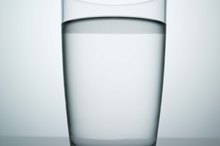What does fact checked mean?
At Healthfully, we strive to deliver objective content that is accurate and up-to-date. Our team periodically reviews articles in order to ensure content quality. The sources cited below consist of evidence from peer-reviewed journals, prominent medical organizations, academic associations, and government data.
The information contained on this site is for informational purposes only, and should not be used as a substitute for the advice of a professional health care provider. Please check with the appropriate physician regarding health questions and concerns. Although we strive to deliver accurate and up-to-date information, no guarantee to that effect is made.
Hydrogen Peroxide & Weight Loss
Hydrogen peroxide, available in supermarkets nationwide, is a household cleaner most commonly used to remove blood and other organic stains from clothing and carpet. Recently, self-appointed health "experts" have advocated drinking it. While the idea that a cheap, widely-available product could make the pounds melt off is tempting, there are serious problems with using hydrogen peroxide for weight loss.
Misconceptions
Using hydrogen peroxide for weight loss is based on the common, but flawed, idea that toxins somehow “build up” in the body, causing a wide array of health maladies. The specific concept behind using hydrogen peroxide for weight loss is that “toxins” interfere with your cell's ability to absorb the oxygen they need, causing low oxygen concentrations in your body's fluids. By drinking hydrogen peroxide, which contains oxygen, you are supposedly able to restore your body's natural oxygen balance.
The Facts
The Disadvantages of Drinking Distilled Water
Learn More
Low blood oxygen, also known as hypoxemia, is a medically-recognized condition 1. Hypoxemia is characterized by shortness of breath and may be the result of any number of serious health conditions including congestive heart failure, pneumonia and lung diseases, all of which require treatment by a physician, not dosing yourself with a household cleaner 1. However, the idea that your body can't get rid of toxins on its own is simply untrue, according to Dr. Nasir Moloo, a gastroenterologist with Capitol Gastroenterology Consultants Medical Group in Sacramento, quoted by MSNBC.
Risks
Hydrogen peroxide is highly toxic, especially in large amounts. The Materials Safety Data Sheet for hydrogen peroxide --which federal law requires be made available to workers who may be exposed to this chemical -- states that hydrogen peroxide is corrosive to skin, mucus membranes and eyes. The MSDS also reports ingestion of this chemical can cause:
- stomach upset
- fluid buildup in the lungs,
- respiratory arrest
- the medical term for “not breathing anymore.” While proponents of “hydrogen peroxide therapy” recommend mixing a very small amount with water
- one mistake could put you in the emergency room
- or worse
- the morgue
Side Effects
Liquid Oxygen & Weight Loss
Learn More
Another problem with hydrogen peroxide for weight loss is that proponents instruct you to ignore symptoms that might ordinarily prompt a 911 call or at least a visit to your doctor. Common sense, by contrast, would suggest talking to a medical professional if boils start erupting all over your body.
Healthy Weight Loss
Unfortunately, there isn't any magic formula for weight loss. If you need help, speak to your doctor or a nutritionist rather than relying on scientifically unsound, potentially dangerous weight-loss methods.
Related Articles
References
Writer Bio
Melanie Greenwood has been a freelance writer since 2010. Her work has appeared in "The Denver Post" as well as various online publications. She resides in northern Colorado and she works helping to care for elderly and at-risk individuals. Greenwood holds a Bachelor of Arts in pastoral leadership from Bethany University in California.









